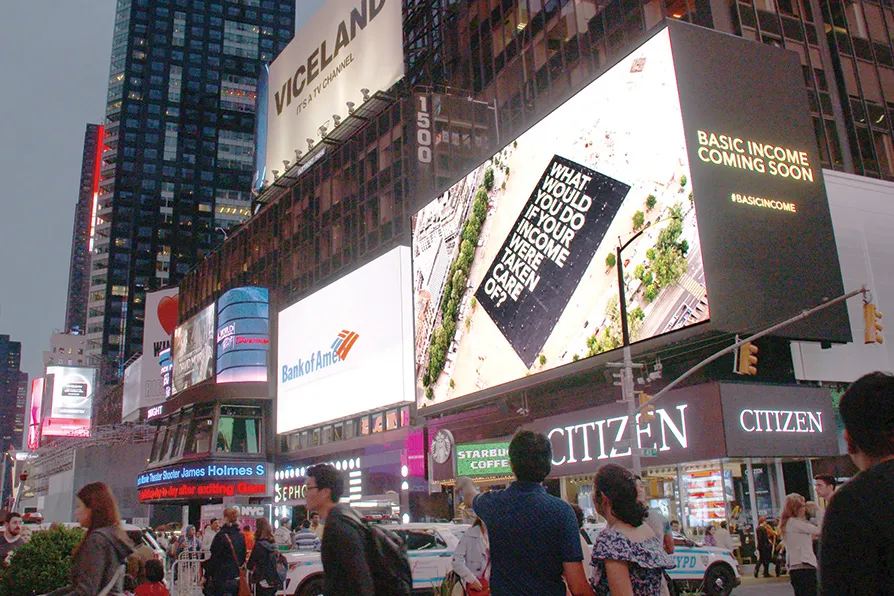SUE TURNER is fascinated by a book that researches who the largely immigrant workforce were that built the Empire State
HENRY BELL takes issue with the assertion that basic income is a remedy for poverty when it doesn’t address the inbuilt inequality of capitalism

 Video of the “biggest question in the world” plays on one of the screens in Times Square in New York City May 2016 / Pic: Generation Basic Income/CC
Video of the “biggest question in the world” plays on one of the screens in Times Square in New York City May 2016 / Pic: Generation Basic Income/CC
Basic Income: The Policy That Changes Everything
The Common Sense Policy Group, Policy Press, £9.99
AS automation and large language models continue to render ever-growing swathes of the working and middle classes redundant, capitalism is returning to its central concern — how to drive down wages but keep consumption up. One answer that now arises from both the left and right is a basic income.
In this book, The Common Sense Policy Group offer a moderate polemic arguing for a basic income, chiefly from a public health point of view.
Their vision is of a weekly payment made to individuals by the government. It is not intended to replace the need to work, but instead to provide a stable ground level below which one cannot fall.
In doing so they hope it would alleviate poverty, eliminate destitution and allow people to direct their energy towards positive and meaningful work and action, through choice, not financial imperative. They argue that a basic income will make people freer and more productive with the positive impacts rippling upwards through society in reduced crime rates, better health outcomes, securer families and enhanced community.
Their aims are laudable, yet blinkered reformism is the key vice of this book.
They assert that they are not making a political argument, and position their work as a pragmatic and practical argument based on evidence rather than rights. They encourage us to look at the vast wealth and the equally vast poverty that surrounds us in Britain today and to understand, through the lens of health, that this must be addressed. Any Marxist reader will find themselves frustrated by the authors’ refusal to address the actual capitalist system that produces this inequality and ill health in the first place.
In their opening argument the authors lay out how increasing anxiety and despair among Britain’s youth are a key argument for the introduction of a basic income. And yet they ignore the fact that the young are anxious because they are preyed upon by bosses and landlords, that they are filled with despair by the images of imperial war, genocide and climate collapse. To claim that the existential dread experienced by young people caught in the crosshairs of profit and exploitation can be alleviated by £100 a week is hard to take seriously.
Of course we should support any palliative that improves the lives of the working class, but we should not pretend that it is a panacea.
The book notes that life expectancy in Britain has not improved since 2011, but fails to make the connection between this and the global financial crash from which global capitalism re-emerged in its latest ruthless phase of imperialism abroad and authoritarianism at home. In fact the authors quickly begin to ally themselves with these authoritarians: “No-one thinks basic income should be completely universal” they intone. No of course not! Who could bear the money going to those people with the poor sense to be arrested or, worse still, born abroad.
Herein lies a dangerous reality at the heart of their argument. By doing away with “the patchwork of ameliorative policies” that are currently in place such as universal credit child benefit and housing benefit, the authors are streamlining the state but also extending its carceral possibilities. Such centralisation of power, without any plan or proposal for removing power from capitalists is never going to reduce ill health and inequality.
The whole premise of basic income converts citizens from being part of a society into potential clients. It presents money as the solution to problems that we know to be caused by money. It runs the risk of distorting people who are even now still the shared owners of housing, healthcare, libraries, schools and museums, into just so many potential customers in the online pharmacies and gig-economy bedsits of the future. However the authors seek to dress it up, their vision of basic income remains one in which the market has the answers to the poverty and inequality around us.
The only basic income that would actually change everything is the one that capitalism can never grant, the one that frees people from being compelled to work in order to live.
Readers of this book would do well to think not about how basic income will change everything, but instead how we would need to mobilise in order to ensure that such a policy is not used to serve capital against the working class.
The authors correctly identify that after the collapse of both the post-war settlement and the neoliberal consensus our mainstream politics are at a crossroads and that a new offer must be made to the workers to fend off the cynical right-wing suitors that are everywhere. If such an offer is to be basic income then that policy needs to reckon with hard material and political realities in a way that this book fails to do.

STEVE ANDREW recommends a Marxist analysis of the long chains of production that global corporations exploit

JOHN GREEN asks how can we take decisive action on population levels with a world leader who is a destructive ignoramus

MARJORIE MAYO welcomes challenging insights and thought-provoking criticisms of a number of widely accepted assumptions on the left

HENRY BELL is provoked by a book that looks toward, but does not fully explore the question of who gets to imagine the shapes of cities to come










